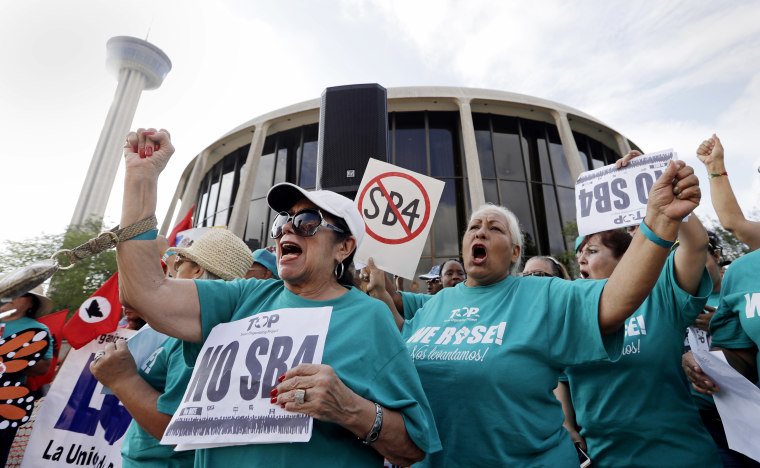Some Republican candidates' campaigns have defended their use of controversial immigration-related ads and messaging by saying it reflects their voters' hard line stances on the issues, but two studies find it also works the other way around.
A study from University of California-Riverside found that ads and inflammatory language are actually “activating” voters' latent stereotypes about Latinos and immigrants and those sentiments in turn are influencing how voters feel about immigration policies.
"It's an effective strategy to first paint immigrants as dangerous, and then base your campaign on addressing that as a problem," said Loren Collingwood, an assistant professor at University of California-Riverside and co-author of the studies. "They tried this in Virginia, and President Trump has been doing this with messaging on MS-13 recently."
The study, Race, Place, and Building a Base: Latino Population Growth and the Nascent Trump Campaign for President looked at the relationship between support for Donald Trump during the 2016 Republican presidential campaign and local Hispanic population growth.
The results of the analysis found that support for Trump was unrelated to Latino population growth in the poll respondents' area. But after Trump made widely publicized speeches attacking immigrants and Latinos, such as his infamous Mexican "rapists" speech and his speech advocating for a wall, the relationship between local Latino growth and support for Trump became statistically significant.
"We demonstrate that residing in a high-Latino-growth area is predictive of support for Trump following, but not before, his utterance of inflammatory and bellicose comments about Mexican immigrants," states the study's abstract.
In a second study from UC-Riverside, Public Opposition to Sanctuary Cities in Texas: Criminal Threat or Immigration Threat?, Collingwood and Benjamin O'Brien found that Republicans in Texas were not evaluating their support for ending sanctuary cities on the basis of crime in the area. Instead, they found that support for ending sanctuary cities correlated with a higher rate of Latino population growth.
"What we do see is a statistically significant relationship between people who live in high Latino growth rate areas and support for banning sanctuary cities," said Collingwood.
Republicans like Attorney General Jeff Sessions insist that sanctuary cities protect criminals and make cities more dangerous, a contention that is unsupported by the evidence.
In an phone interview with NBC News, Collingwood said his research shows that misleading messaging tying immigrants to criminal gangs, such as MS-13, triggers fears among people, which in turns drives strong sentiments against immigrants and sanctuary city policies. Collingwood said these attitudes are not in response to crime, but about stereotypes regarding Latinos and immigration.
"The argument Republicans make is that they are merely supporting anti-sanctuary city laws because sanctuary cities make communities more dangerous; however we do not see any correlation between crime rates and support for banning sanctuary city laws," said Collingwood. He argues that if crime were indeed the reason for supporting bans on sanctuary cities, we should see increases in crime correlating with support for banning sanctuary cities, but that is not what is happening.
Florida House Speaker Richard Corcoran recently posted a controversial political ad in which a young white woman is seen walking through a nice neighborhood. The scene turns ominous as a scruffy man wearing a hoodie follows the young woman and draws a weapon from his sweatshirt and kills her. "A young woman, gunned down by an illegal immigrant who should have been deported," Corcoran says in the voice-over.
Corcoran then issues a message against sanctuary cities, comparing the scene to the death of Kathryn Steinle, a young woman whose death became the symbol of undocumented immigrant crime for conservatives and Trump during the presidential election. The immigrant accused of Steinle's murder was later acquitted; the man, Jose Ines Garcia Zarate had found a handgun wrapped in a shirt under a chair on a pier and when he picked it up the gun went off, killing Steinle.
Corcoran said the ad was intended to garner as much grassroots support as possible for HB 9, a bill that sought to ban sanctuary cities in the state of Florida.
The Southern Poverty Law Center (SPLC) called the ad "fear mongering", and the Palm Beach Post reported that Democratic candidate for governor, Andrew Gillum called the ad a "dog whistle."
Collingwood says the research clearly shows that Republican ads using negative imagery about Latino immigrants and crime activates latent bias and contributes to support of anti-immigrant policies.
"As Republicans double down on this message, anti-immigrant and anti-Latino sentiment will continue to grow, and it is on Republican elites for driving this," said Collingwood.

